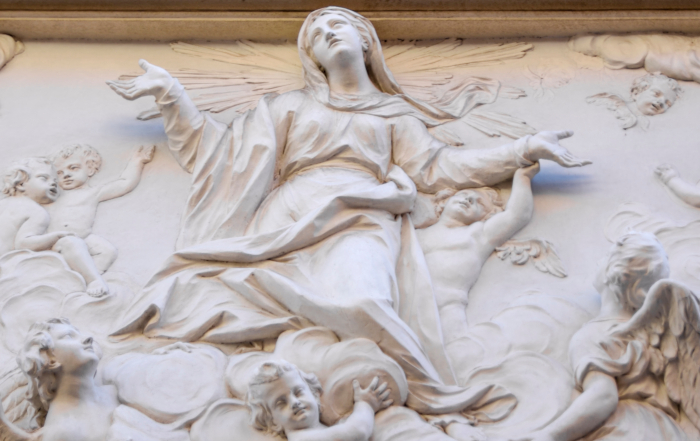Mary’s Song, Our Invitation
The story of Mary is intended by God as a sign of hope that our redemption has been accomplished. Do you notice in the Song of Mary, the Magnificat, all the verbs that refer to God’s work are past tense?
My soul magnifies the Lord, and my spirit rejoices in God my Savior, for he has looked with favor on the lowliness of his servant. Surely, from now on all generations will call me blessed; for the Mighty One has done great things for me, and holy is his name.
His mercy is for those who fear him from generation to generation. He has shown strength with his arm; he has scattered the proud in the thoughts of their hearts.
He has brought down the powerful from their thrones, and lifted up the lowly; he has filled the hungry with good things, and sent the rich away empty. He has helped his servant Israel, in remembrance of his mercy, according to the promise he made to our ancestors, to Abraham and to his descendants forever (Luke 1:47-55).
A Sign of Hope
All of that is in essence, a way of trying to think forward. This is God’s action, He is doing it,so it comes into being. And already you see, as it comes into being in his divine knowledge, it breaks forth into earthly circumstances and is carried out so that even before it is spoken, it is done. Because God’s commands, God’s will and God’s actions are irreversible.
This is critical, because at one level, the one thing that qualifies, as Athenasius called her, “our sister Mary” is the promise he had already made to the nation of Israel.
Prior to the outpouring of the Holy Spirit on Pentecost, who was Mary? His choice of her is literally an act of God’s mercy. She was the most unassuming of women, and we’d have passed over her in a heartbeat. We’d always be attracted to the better qualified, the better looking, the better connected.
But God saw something very different. And his choice became a sign of hope to you and me. Because if our sister Mary can become the bearer of the word of God, there is nothing that qualifies her, as it were, for that role. It is meant to be a sign of who God is and of what is he doing. Again, ”he has brought down the powerful from their thrones, and lifted up the lowly” (Luke 1:52).
A Word of Good News
That means we’re in, you see. And the basis of our redemption before God is what we see even in the angel Gabriel speaking to Mary: She doesn’t qualify, but she is chosen. And that is also true for you and for me.
No, we don’t bear the same responsibility she had, but she is indeed our sister. I fear sometimes that the “queen of heaven” language, while not inappropriate, can be a device that we use to separate her from us. And this shortchanges the good work of what God desires to do in us who are also very unqualified, except by God’s choice.
Mary’s story is meant to be a word of good news to you and me. She is in fact, a foretaste that finally finds its fulfillment in the Galatian lesson. We are now heirs, heirs of all that God would ever want to give to us and more. And so don’t think about her as separated and set apart; think about being welcomed into a song in which she stands with us, pointing the way, even giving really good advice, like “Do whatever he tells you” (John 2:5) from the story of the wedding at Cana, where he turned the water into wine.
We give thanks for Mary’s life and for the way God gave her the courage to say yes. And even as we also have been chosen, unqualified as we are, may we too have the courage to keep saying yes.
How does Mary’s story speak to you? Please include my username, @revgregbrewer.
(This post is an adaption of Bishop Brewer’s sermon on August 15, 2019, in the Bishop’s Oratory of the Diocesan Office, Orlando).
Unless otherwise noted, Scripture quotations are from the New Revised Standard Version Bible, copyright © 1989 the Division of Christian Education of the National Council of the Churches of Christ in the United States of America. Used by permission. All rights reserved.

